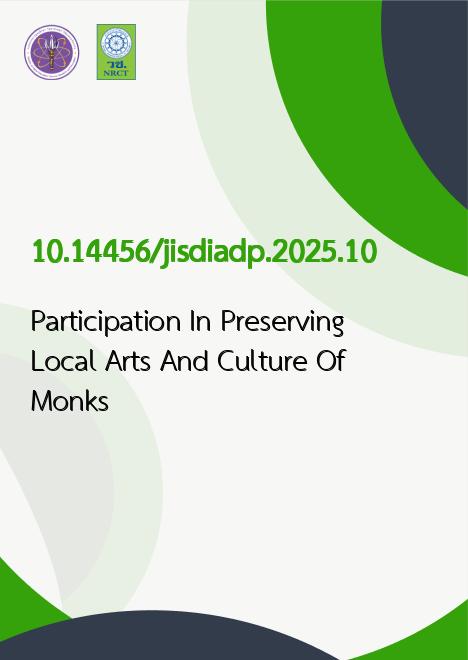
|
Participation In Preserving Local Arts And Culture Of Monks |
|---|---|
| รหัสดีโอไอ | |
| Creator | Phra Athikan Innut Suwanno |
| Title | Participation In Preserving Local Arts And Culture Of Monks |
| Contributor | Phrakhru Suthaphatbandit, Phrakhrusri Pariyattayarak, Phrakhru Wisutthichayakorn, Phramaha Thongchai Sundaracaro |
| Publisher | DR.KET INSTITUTE OF ACADEMIC DEVELOPMENT AND PROMOTION |
| Publication Year | 2568 |
| Journal Title | Journal of Interdisciplinary Social Development |
| Journal Vol. | 3 |
| Journal No. | 1 |
| Page no. | 137-157 |
| Keyword | Participation, Conservation, Monks |
| URL Website | https://so12.tci-thaijo.org/index.php/JISDIADP/about |
| Website title | https://so12.tci-thaijo.org/index.php/JISDIADP/index |
| ISSN | 2822-1060 |
| Abstract | Buddhism has long been a fundamental foundation shaping the way of life, values, traditions, and artistic expressions of the Thai people. It serves as a guiding principle for life, inspires the creation of art and architecture in temples, and acts as a center for education and ethics. Various traditions, such as Songkran, Buddhist Lent, and the Kathina ceremony, reflect the deep connection between religion and culture. Furthermore, Buddhism plays a crucial role in strengthening Thai society by instilling moral values, preserving local traditions, and fostering harmony between humans, nature, and society, ensuring cultural balance and sustainability. It is not merely a religion practiced by Thais but an integral part of life and spirituality, shaping a strong, unique, and culturally rich society that is worth preserving and passing on. To promote awareness and develop conservation plans that align with community contexts, local leaders such as monks, teachers, and village heads play a vital role in organizing communal activities, including merit-making ceremonies, local traditions, and environmental conservation projects. These initiatives help build strong relationships and instill a sense of cultural and artistic preservation within Thai society.The preservation of local arts and culture is essential in maintaining community identity, with Buddhist monks playing a key role in instilling awareness through the principles of Ditthadhammikattha-samvattanika-dhamma, which include diligence, financial and reputational integrity, association with good companions, and a life of sufficiency. Additionally, applying the POSDC management principles-planning, organizing, staffing, directing, and controlling-ensures that conservation efforts are systematic and effective.In conclusion, sustainable development of local arts and culture requires collaboration from all sectors through social networking, the use of technology to promote culture, and the integration of the creative economy with local traditions. A structured and continuous approach will help preserve arts and culture securely, benefiting communities in the long term. |
